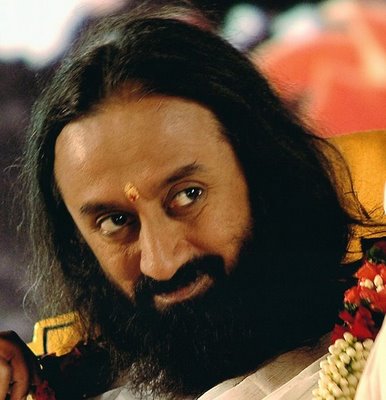By Sankrant Sanu.
Art of Living is a spiritual foundation. Started from scratch by Sri Sri Ravi Shankar about 25 years ago, it now has a presence in over 140 countries, with over 20 million people worldwide having taken its programs. Even by the measure of entrepreneurial success alone, that is an amazing story.
Sankrant Sanu (SS): Art of Living is an example of a very successful entrepreneurial organization. How was this success achieved?
Sri Sri Ravi Shankar (SSRS): The success of any institution is in the efficacy of the product. When the product is very useful to people, it brings benefit; success, then, is natural. That is one aspect. The second aspect is that of philosophy. There are many people who “talk the philosophy”, but don’t “walk the philosophy” That has very little impact on people. But when you walk the talk, that makes a lasting impact—and it helps people walk the talk, too.
SS: Is there an aspect of marketing in the way you are spreading ideas?
SSRS: Actually, we are very low in marketing. We don’t need it, and are not interested in it.
SS: This is because the product [speaks for] itself …
SSRS: Yes. Moreover, we can’t cater to the demand as of now. We are unable to find quality teachers; we need to train more and more teachers. And we are already busy doing that.
SS: There has been some criticism about Art of Living charging for its programs, because it’s a not-for-profit organization.
SSRS: People expect charitable organizations to do charity work. And they want the charity work done by taking charity…
SS: By asking for charity…
SSRS: By asking for charity, which we don’t do. Art of Living charges a small amount for its programs, and whatever money comes from that, it spends on charity. Charity cannot happen from an empty bowl—it needs funds. There is no point in taking charity to do charity. We believe in working, earning, and doing charity from that.
SS: There is a notion that Indian traditions are world-denying and earning wealth is bad. Is that a misplaced notion, or is it true?
SSRS: Not at all. Lakshmi, wealth, is regarded here as a devi, as part of divinity. So here, wealth is always worshipped, honoured. We have never said that wealth is bad. We need to create wealth. This notion is the result of an impact from the outside; it is not in the Indian ethos. When you give blessings, you say, dhandhandya smridhirastu (which means, “Let there be an abundance of everything.”). Our country’s wealth has been plundered so many times in its history; in spite of this, it is really marching ahead. If Hinduism believed in poverty, it would never have had so many riches.
SS: So the businessmen engaged in wealth creation should, in fact, feel good about their part in society?
SSRS: Definitely. That is their dharma. If you are in business, you have to create wealth not just for yourself, but for the whole society.
SS: Is there any message you would like to give entrepreneurs as they are creating this wealth?
SSRS: Entrepreneurs should also support the buying power of people.
SS: What does that mean?
SSRS: The buying power of people has to do with corporate social responsibility, or CSR. This has been a part of our ethos for thousands of years, but these words have been coined only now. Almost every business house you see has always been engaged in charitable work—they have built schools, tanks, dharamshalas, temples.
SS: So are you saying that, traditionally, CSR has always been there?
SSRS: Yes. Traditionally, it was always there. Hospitals, schools, tanks and dharamshalas have always been built by these institutions. I would like them to continue doing that, and keep 10 percent of their earnings for education, health and social welfare.
SS: How can the Art of Living programs help entrepreneurs?
SSRS: To be an entrepreneur, you need to have creativity and intuitive power. Art of Living can provide both—creativity and intuition. Meditation and pranayama bring out these two [qualities] from within.
SS: There is a shift seen in young people today, from being job-seekers to wanting to do something on their own.
SSRS: This is what we need to provoke in them, to create in them. Usually, people want to be in the comfort zone, so they seek out a job. Once they get comfortable in a secure job, their creativity dies. Then, there is no enthusiasm left in them. That is how people get into depression. Here, [at Art of Living], we encourage people to stretch out of this comfort zone and see the Spirituality gives you the strength to stretch out of your comfort zone and be an entrepreneur.
© 2010 Sankrant Sanu, all rights reserved.




Love the blog, found it in yahoo, how do I subscribe?
i am working hard to be a good Entrepreneur in online services. I also attend online seminars to sharpen may skills.””`
Relevant questions. Spot Answers.
Indeed an interesting Interview with Sri Sri by a successful Entrepreneur.
Worth read for every aspiring entrepreneurs: Give insight into elements of entrepreneurial success & clarifies misconceptions about Earning wealth, Hinduism, Art of Living.
Entrepreneur is one who does better use of existing resources to the uplifting of the people without making huge cost imposed on service of modifying better usage. So called spiritual Entrepreneurs have exploited the innocence in society to make fame in the name of God, yet failed miserably to attain the God themselves first as they have no other power but to beg in other form of Charity can't be spiritual entrepreneurship any more.
@Balakrishna Khandadhi
did you even read the interview before commenting? :p
I have attended AOL courses and satsangs.It is not done in “the name of God”
AOL courses mostly involve yoga+pranayama +personality development stuff.
How does it that “exploited the innocence” in “name of God”.
There are atheists,Buddists,communists and all type of people attend courses
of AOL and benefit from them.They charge in urban areas&at ashrams.Provide free courses to poor in rural areas.